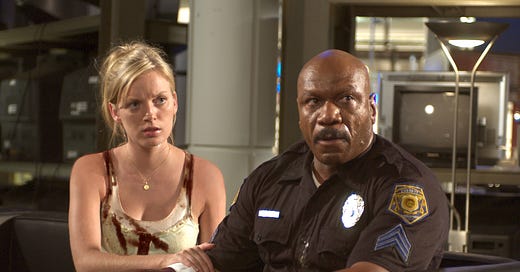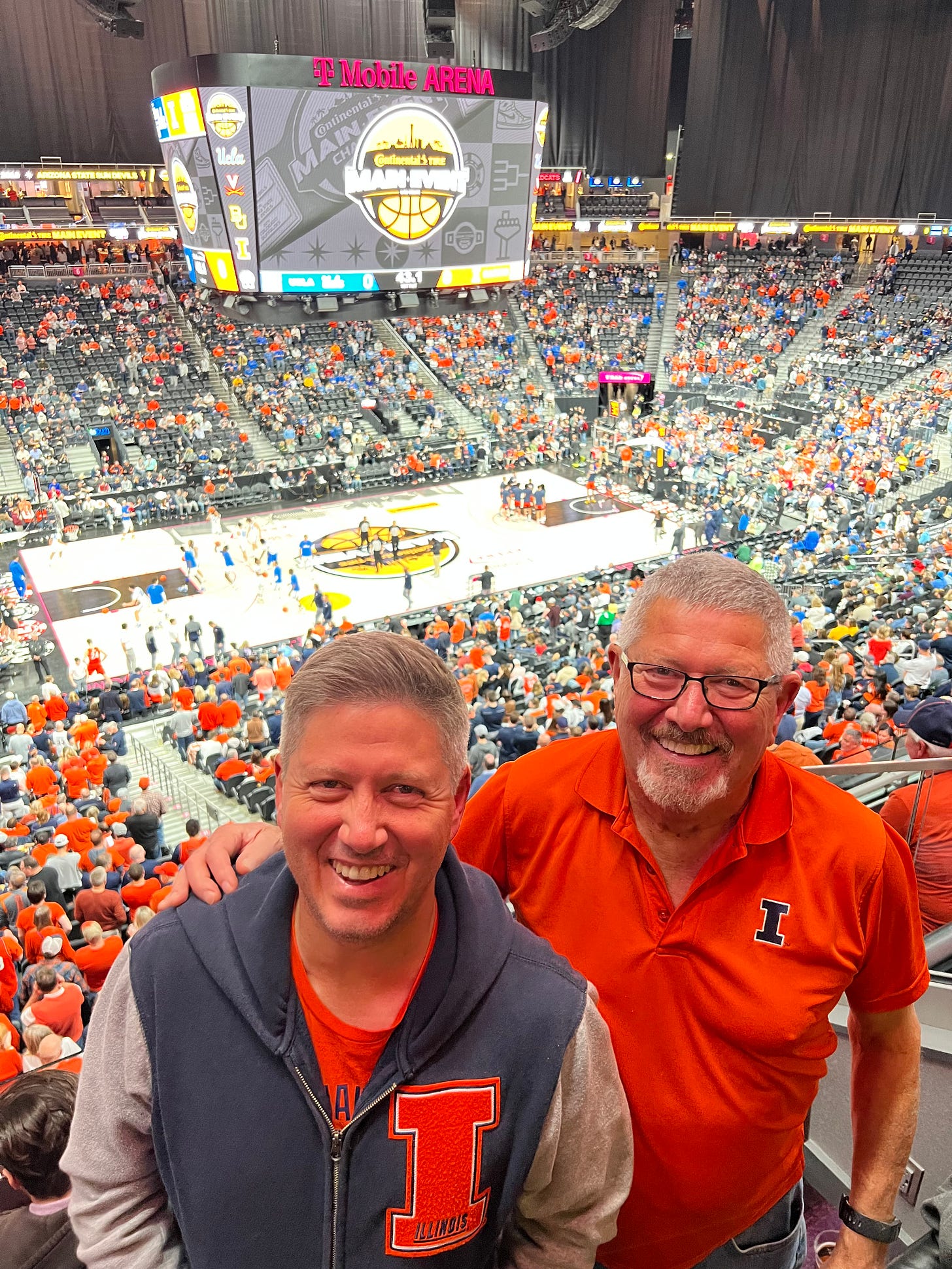Here is a button where you can subscribe to this newsletter now, if you have not previously done so. I do hope that you enjoy it.
I did not recognize the pimpled, heavily orthodontic’d teenage boy standing on our front porch, which was strange, because I was a pimpled, heavily orthdontic’d teenage boy myself—I had thought I knew all the members of our sad little gaggle in a 20-mile radius. He had the vacant, empty gape of the teenage boy, like an invisible hand was holding him in the air by the back of his shirt, everything just hanging slack.
I’d just taken the pizza from him, the first pizza I’d ever had delivered to our house. Villa Pizza of Mattoon had recently announced they were expanding their delivery base outside of city limits, even way out, 15 miles away, to the Rural Routes and unmapped territory way out by Lake Paradise, where we lived. He’d gotten lost, but now he’d made it, and now he had handed me my pizza and taken my 15 bucks. But he was still standing there, for some reason. Then it occurred to me.
“Oh,” I said, digging into my jeans pockets. “A tip. Sorry, I forgot about that.” Then I handed him a quarter and closed the door.
Villa Pizza changed their policy on outside-city-limits deliveries a few weeks later.
********************
I have many blind spots as a human being, but one of the biggest ones is that I have never worked in the service industry. My sister was a server for a whole series of fancy restaurants in Champaign, and later San Francisco, and this experience—of seeing the consumer in their full, florid consumerist glory—has given her an understanding of human behavior that I have never, and will never, be able to access. Jill—among other people—likes to make fun of me for having an overly optimistic view of the world and its people, for believing that people are inherently good, or want to be.
“You only think that because you’ve never been a waiter,” she said. “People are terrible.”
She’s right about one thing: I’ve never had a job where I served strangers, and definitely not one where I relied on their tips for my wages—which is to say, I’ve never had to stand there and smile and eat shit because The Customer Is Always Right. My high school job was working as an usher and projectionist at a movie theater, which was a cool high school job: You got to wear a tie and dress nice and watch movies all the time and give free popcorn to all your friends and be at the absolute dead center of the Mattoon High School social ecosystem every Friday night. (And invite girls you liked to late-night screenings of whatever movie they wanted to see.) The worst thing I ever had to do at that job was throw middle school kids out of the theater when they wouldn’t stop talking, and I have to say that was actually kind of fun. (Whenever someone mocks a mall security guard for really enjoying the power they have over this silly little fiefdom, you should know that, yes, they really enjoy it, and they really enjoy wielding it. It’s fun!) After that job, I worked for the college newspaper—back when you could pay your campus rent if you wrote enough for the student paper—and I had my first job in the working world roughly two weeks after graduation. Other than the few weeks I spent in 2001 doing temp work—mostly stuffing envelopes and carting boxes with hand trucks across Manhattan—I’ve been sitting at a desk, once at someone else’s and eventually at my own, for my entire adult life. I don’t really have to talk to, or deal with, anyone at all.
Which is to say that I really don’t have any idea what it’s like out there. But I think I’d be a lousy server, for a simpler, worse reason: I don’t like taking orders, from a boss or a customer. Now, I know that no one likes taking orders from people, though I suppose it can be a fetish for some. But—and this is certainly because I’ve been so privileged to work on my own for so long—I must say it drives me batty. This is not to say that I do not have people I must answer to: I consider one of the primary responsibilities of a writer, maybe the primary responsibility of a writer, is to make you editor happy, and their life easier. I trust my editors explicitly and unconditionally, and I make sure they can trust me just as much: We are the very definition of On The Same Side. But because my editors and I have that trust in each other, neither one of us needs to micromanage the other. I have an idea, I run it by to them, they say “hey, good idea,” I write it up the way I write things up, I send it to them, they clean it up and tell me what I need to fix, I fix it, the piece runs and then we all go do it all over again. It’s a clean, bloodless process. What doesn’t happen is them standing over my shoulder, saying, “Oh, I wouldn’t use that word. Why would you use that word?” I don’t even like someone being in the same room with me when I’m writing. The notion that someone, a customer, a manager, whatever, would make demands of me right in front of the whole world, who would tell me what to do, makes the hair on the back of my neck stand up. It seems horrifying, humiliating, gutting. And it happens everywhere, every single second of the day.
A couple of weeks ago, I volunteered to help out at the concession stand at a Little League game here in Athens. My job was to be in charge of the fryer where we made french fries. I have never operated one of those machines before, so the guy who runs the stand all the time explained to me how it worked, gave me some suggestions, and pointed out some mistakes other volunteers had made. I said thank you, got it, and went about making some french fries. The thing was, though: He kept coming back around and checking on me. When I was doing something wrong, he corrected me. He recommended I do this, or this, or this. Every time I’d get in a bit of a rhythm he’d come back by and tell me what I needed to adjust. And by the fifth time he came around, I have to tell you: I was ready to murder him. This despite the fact that he was doing exactly what he was supposed to do—advising me, suggesting best practices, helping out—in a way that wasn’t even slightly condescending or demanding. He was making my work better while I was doing it … and it drove me nuts. I realized something sort of distressing and stupidly stubborn about myself: I’d rather get something wrong on my own than have someone constantly telling me how to get it right. This is the sign of someone who has been very spoiled in their work situation. And it’s a sign of a truly, profoundly terrible server. (Oh, and I burnt the fries.)
This has thus made me appreciate restaurant servers, and really anyone with a public-facing job, in a fashion that can approach awe. I honestly do not know how you do it. You have a boss constantly watching what you do. You have people constantly casting judgments upon you and using that judgment to decide how much they will pay you for your job. You have to grin and bear nearly every humiliation that comes your way. Oh, and also you have to do the actual job. You have to time out when the appetizers come and when the main course does, you have to constantly be looking to see when someone wants another drink, you have to know when people are ready to have their table cleared, you have to physically balance all that stuff in your hands—I would be constantly dropping everything, seriously, all the time. It’s absurd. I sometimes think it is the hardest job in the world.
Oh, and then there was a pandemic, when doing this job meant meeting a bunch of strangers who might be breathing the plague in your face.
But the best way to show your appreciation, for the service, for the ability to pull it off, for the patience, for all of it … it’s obviously to tip, and tip big. There are many failings I have in this world, many things I’m always screwing up. But one thing I do, and always will, in part because I still feel guilty about that kid on our Mattoon porch all those years ago: I tip huge. I’ve become a full, automatic 25 percent tipper, essentially everywhere, regardless of “quality” of service (“quality” in quotes because it’s such a subjective term anyway). It’s 25 percent. Automatic. Every time. If I can, I’ll even hit 30. The people who do that job deserve every penny, and I do believe that the people in my life who have in their life are stronger, and more realistic about the world, than I am. Every time I hit that button, I think back to that poor kid, driving 15 miles in a beaten up brown 1987 Ford Escort with the muffler hanging off the side, standing there as I gave him a quarter for his troubles. Don’t spend it all in one place, kid.
Here is a numerical breakdown of all the things I wrote this week, in order of what I believe to be their quality.
Be Ready to Cheer For the USMNT Again, New York. And here’s the second one.
MVPs, Ranked, MLB.com. Updating a piece I wrote a few years ago, with the new crop.
Ron DeSantis Should Not Run Against Trump, Medium. It’s a sucker’s bet, Ron!
Five Teams Ready to Make the Postseason Leap, MLB.com. Get excited, Orioles fans.
So, Who’s Gonna Win Georgia? Medium. I think it’s going to be extremely close.
Best Active Players Never to Win the MVP, MLB.com. Feel like it’s next year or never for Arenado.
Best Active Players Never to Win the Cy Young, MLB.com. Adam Wainwright, alas, is never gonna get one.
The Thirty: Best Award Candidate From Every Team, MLB.com. The week before Thanksgiving is always a very hectic one.
PODCASTS
Grierson & Leitch, we discussed “Black Panther: Wakanda Forever,” “Armageddon Time” and “Spirited.”
Waitin' Since Last Saturday, we previewed the Georgia-Kentucky game.
Seeing Red, no show this week.
LONG STORY YOU SHOULD READ THIS MORNING … OF THE WEEK
“Sarah Polley’s Journey from Child Star to Feminist Auteur,” Rebecca Mead, The New Yorker. I’ve been a huge, huge fan of Sarah Polley for two-plus decades now—Stories We Tell is just a knockout of a movie—and I feel like I’ve been waiting for a profile as thorough as this one about her nearly as long.
Also, the writer Michael Gerson died this week. He was a former speechwriter for George W. Bush and an eloquent writer about matters of faith and politics. But I was absolutely wrecked by this piece about dropping off his son to college:
I know this is hard on him as well. He will be homesick, as I was (intensely) as a freshman. An education expert once told me that among the greatest fears of college students is they won’t have a room at home to return to. They want to keep a beachhead in their former life.
But with due respect to my son’s feelings, I have the worse of it. I know something he doesn’t — not quite a secret, but incomprehensible to the young. He is experiencing the adjustments that come with beginnings. His life is starting for real. I have begun the long letting go. Put another way: He has a wonderful future in which my part naturally diminishes. I have no possible future that is better without him close.
There is no use brooding about it. I’m sure my father realized it at a similar moment. And I certainly didn’t notice or empathize. At first, he was a giant who held my hand and filled my sky. Then a middle-aged man who paid my bills. Now, decades after his passing, a much-loved shadow. But I can remember the last time I hugged him in the front hallway of his home, where I always had a room. It is a memory of warmth. I can only hope to leave my son the same.
Parenthood offers many lessons in patience and sacrifice. But ultimately, it is a lesson in humility. The very best thing about your life is a short stage in someone else’s story. And it is enough.
ONGOING LETTER-WRITING PROJECT!
This is your reminder that if you write me a letter and put it in the mail, I will respond to it with a letter of my own, and send that letter right to you! It really happens! Hundreds of satisfied customers!
Write me at:
Will Leitch
P.O. Box 48
Athens GA 30603
CURRENTLY LISTENING TO
“Adam’s Apple,” Aerosmith. We got our first physical copies of the The Time Has Come bound manuscript this week, and I’ve started to put together a playlist for it, because the book is in many ways about music (as well as a bunch of other things). This song features prominently, if you can believe that. Hopefully when you eventually read the book, you’ll remember this newsletter and be all, "oh yeah! Now I get it!”
Remember to listen to The Official Will Leitch Newsletter Spotify Playlist, featuring every song ever mentioned in this section.
Couple of happy Illini fans out in Vegas right now …
Go Illini! Have a great weekend, all …
Best,
Will







You reminded me of the great line from Dave Barry: A person who is nice to you, but rude to the waiter, is not a nice person.
I learned two things about people in my years working part-time in the service industry. One: 50% will tip and 50% will not and income level doesn't matter! The cheapos just don't believe in it no matter how much money they have. A good example is the current owner of Twitter. Two: you never know where that next tip is coming from so treat all customers the same. Again, it cuts across all income levels.....